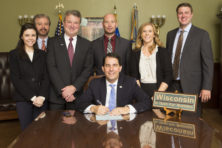Kitchens’ Clean Water Access Bill Passes Senate
- Share
- Tweet
- Pin
- Share
A bill authored by Rep. Joel Kitchens to increase assistance to contaminated private well owners passed the Senate on a voice vote Oct. 31. The bill increases the maximum grant amount for the Department of Natural Resources’ (DNR) well remediation program and allows local governments to assist private landowners in financing for a new well.
“Every citizen deserves to have access to clean water, free from harmful bacteria and chemicals,” said Kitchens in a statement.
While drilling a new well is not a guarantee of clean water, immediate assistance for affected well owners is seen as the first step in addressing groundwater problems that have plagued up to 30 percent of private wells in Kewaunee County and northeast Wisconsin.
The bill increases the maximum amount the DNR can provide to a contaminated well owner from $9,000 to $12,000 to cover a portion of the costs to treat the water, reconstruct the well, construct a new well, connect to a public water supply, or abandon the contaminated well.
At the Food, Land and Water Conference in Elkhart Lake on Oct. 16 and 17, DNR Water Division Administrator Russ Rassmussen said the department’s well remediation program is underused. Many conservationists called the program outdated, naming the amount available per grant as one of the antiquated provisions.
“I think people are afraid we are going to swoop in with our black helicopters and make someone drill a new well, which isn’t true,” said Rassmussen. “You have to actually talk to the DNR to avail yourselves of that and there is mistrust of the DNR. We haven’t gotten many takers.”
The bill does not change the total funds available for the grant program, $180,000, but the increase could incentivize more contaminated well owners to use the program to offset costs.
The bill will also allow a county or municipality to help a private landowner finance a new well. With the well owner’s permission, a local government can rehab or replace a failing well and recoup costs through special assessment, avoiding costly bank loans.
“I am eager for Governor Walker to sign this bipartisan bill into law and provide Wisconsin families with the much-needed relief of knowing they have access to clean water in their own homes,” said Kitchens.

